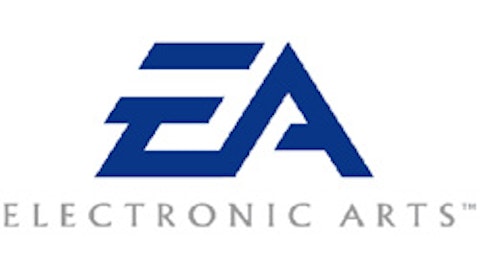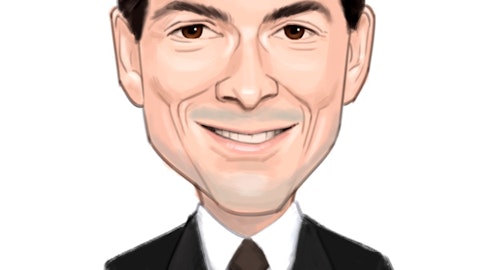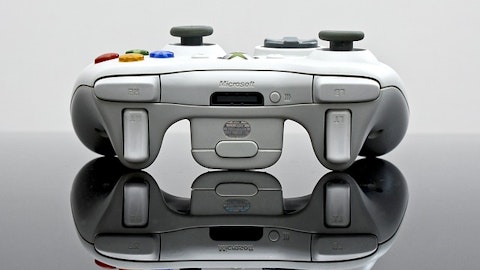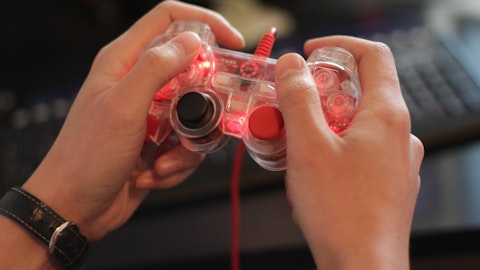On June 24, analysts from Jefferies upgraded their ratings the two of the biggest gaming companies in the world, Take-Two Interactive Software, Inc. (NASDAQ:TTWO) and Electronic Arts Inc. (NASDAQ:EA), to ‘Buy’ ratings from ‘hold’. Let take a look at the two companies and see what Jefferies likes about them, and which, if any, is the better investment.

First a quick word on why we track hedge fund activity. In 2014, equity hedge funds returned just 1.4%. In 2013, that figure was 11.3%, and in 2012, they returned just 4.8%. These are embarrassingly low figures compared to the S&P 500 ETF (SPY)’s 13.5% gain in 2014, 32.3% gain in 2013, and 16% gain in 2012. Does this mean that hedge fund managers are dumber than a bucket of rocks when it comes to picking stocks? The answer is definitely no. Our small-cap hedge fund strategy, which identifies the best small-cap stock picks of the best hedge fund managers returned 28.2% in 2014, 53.2% in 2013, and 33.3% in 2012, outperforming the market each year (it’s outperforming it so far in 2015 too). What’s the reason for this discrepancy you may ask? The reason is simple: size. Hedge funds have gotten so large, they have to allocate the majority of their money into large-cap liquid stocks that are more efficiently priced. They are like mutual funds now. Consider Ray Dalio’s Bridgewater Associates, the largest in the industry with about $165 billion in AUM. It can’t allocate too much money into a small-cap stock as merely obtaining 2% exposure would really move the price. In fact, Dalio can’t even obtain 2% exposure to many small-cap stocks, even if he essentially owned the entire company, as they’re simply too small (or rather, his fund is too big). This is where we come in. Our research has shown that it is actually hedge funds’ small-cap picks that are their best performing ones and we have consistently identified the best picks of the best managers, returning 144% since the launch of our small-cap strategy compared to less than 60% for the S&P 500 (see the details).
Comparing Electronic Arts Inc. and Take-Two Interactive may be a bit tricky as the two companies are not exactly a mirror of the other. Electronic Arts has a market cap of $21.29 billion, while Take-Two Interactive is a light weight by comparison with its $2.42 billion cap. Electronic Arts, based in Redwood City, California and founded in 1982, is the world’s third-largest gaming company by revenue. New York-based Take-Two Interactive, famous for, among other things, its Grand Theft Auto series, was founded in 1993 and incorporates Rockstar Games, 2K Games and 2K Sports.
Take-Two Interactive Software, Inc. (NASDAQ:TTWO), which posted earnings per share for the first quarter of $0.35 has experienced slow growth on the NASDAQ this year, being up by just 1.89% year-to-date, though by a much more robust 31.19% during the last year. With that return, Take-Two Interactive is well below its rival Electronic Arts Inc. (NASDAQ:EA), which has gained an impressive 43.95% so far this year and 86.57% during the last year. The price earnings (P/E) ratios partly explain why; while Electronic Arts has a P/E of 25, Take-Two Interactive has a goose egg, due to the fact that it is posting losses. Analysts do believe that Take-Two Interactive will post earnings of $1.04 per share for 2015 however, implying a P/E of 27.
Let’s take a look at the insider activity and see if it can reveal some major differences between the prospects of the two gaming companies. On June 22, Chief Talent Officer Gabrielle Toledano dumped 8,000 shares of Electronics Arts, representing roughly 6% of her total stake in the company. Some weeks earlier, on the opposite coast, Take-Two Interactive Software, Inc. (NASDAQ:TTWO) General Counsel Daniel Emerson sold 9,150 shares in the company he counsels, leaving him with 53,109 shares. Much more interesting was the insider sales from Take-Two Interactive’s president Karl Slatoff, who on May 27 unloaded 344,666 shares, holding 2.57 million shares or about 2.9% of Take-Two Interactive’s common shares after the sale.
Electronic Arts announced the launch of a number of new games at the recent Electronic Entertainment Expo (E3) event in Los Angeles, gaining the confidence of investors with its strong lineup. Among those were Star Wars Battlefront, Star Wars: The Old Republic, Plants Vs Zombies, Mirror’s Edge Catalyst, Need for Speed, and a number of new games in its various sports franchises, including NFL 16. Given the strong market position for those games, analysts are expecting Electronic Arts to continue its positive development on the NASDAQ and hence rank the share as a “Strong Buy” on average. For Take-Two Interactive, the market is expecting it to release DLCs (Downloadable Content) for Independence Day 2.0 and III-Gotten Gains, and possibly some online updates to GTA 5. The DLCs are expected to be released in July and August/September, since it is not possible due to practical reasons to launch the two during the same months. Gamers however seem to prefer the DLC for III-Gotten Gains and the market anticipates that the launch will be on or around July 4.
So, what top hedge funds showed interest in these gaming stocks? Philippe Laffont, representing Coatue Management, increased his stake in Electronic Arts Inc. during the first quarter by 77% to 6.55 million shares but had no holdings in Take-Two Interactive. In Take-Two Interactive however, David Einhorn and his fund Greenlight Capital had a great stake of 4.70 million shares, which he left untouched during the quarter. Einhorn did not have any holdings in Electronic Arts Inc. The interest for Take-Two Interactive is solid, with 34 of 730 hedge funds in our database having stakes in the company as of March 31, the same as three months prior. Regarding Electronic Arts, 41 funds had positions on March 31, up from 40 at the end of 2014, indicate a slight increase in optimism heading into this quarter.
Although Electronic Arts has been having a strong last year, it seems like it is still the preferred pick of the smart money, and has a lot going for it. While it has become increasingly maligned among gamers for its love of DLC and DRM, it remains one of the best gaming companies in the world with a huge stable of hit series, and the top gaming stock in the world.
Winner: Electronic Arts (EA)
Disclosure: None





